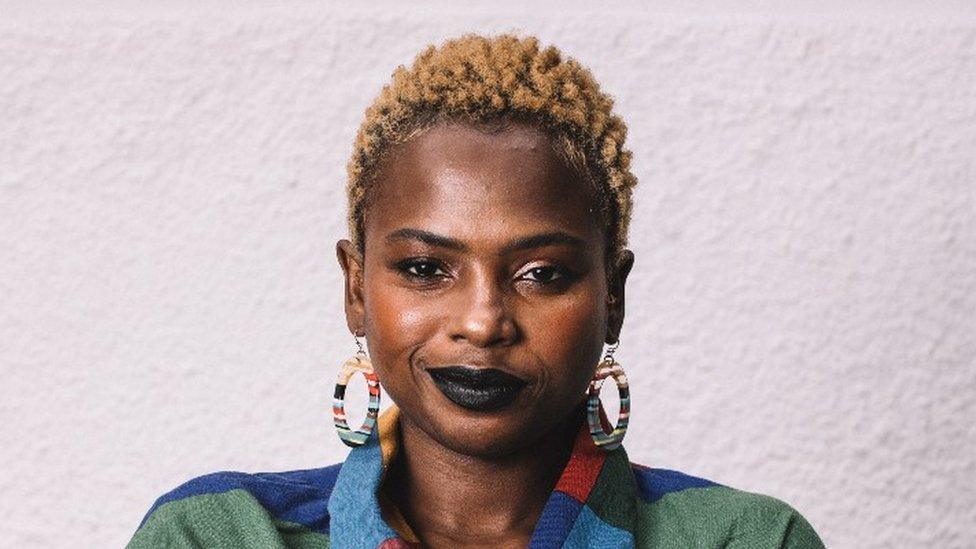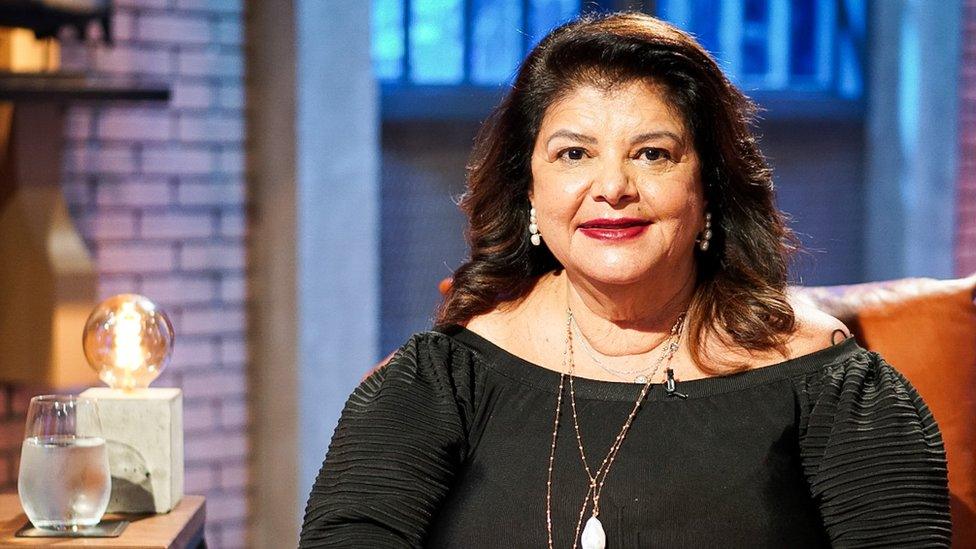Brazil at work: Black and held back
- Published

Luana Genot felt held back because of the colour of her skin
"I felt my career was limited by my skin tone. I would hear that I didn't match the profile. Or that I wouldn't be someone they would promote," recalls Luana Genot.
Ms Genot does not have the fondest of memories of trying to break into the communications industry in Brazil.
But instead of just getting angry, she decided to do something about it: she is now the executive director of the Identities of Brazil Institute, an NGO which helps companies change their culture around black staff.
However, Ms Genot's professional start in life was very different. She started modelling when she was still a teenager living in Rio, and her career in fashion took her all across the globe, from London to Paris to South Africa.
The work might have appeared glamorous from the outside, but Ms Genot felt held back because of the colour of her skin, as clients often could not imagine someone like her representing their brands.
When she quit modelling and returned home, she encountered the same roadblocks.
'Fake racial democracy'
More than 50% percent of the country's 208m people define themselves as black or "pardo", a category in the Brazilian census which describes people of mixed race.
However, data from 2016 show that black people only occupy around 6% of managerial positions and get paid an average 44% less overall.
"Here there is this racial democracy myth where everyone, regardless of their skin tone, can be welcomed. And that's fake," Ms Genot says. "The message for me was that this paradise doesn't exist. We need to build it."
Which is exactly what she is trying to do with her Institute - helping Brazilian companies be more "actively anti-racist", as she calls it.
She sees how much companies benefit from attracting and keeping black talent that would not view a corporate job as a possibility.
"This is not a favour for black people. Companies need those black heads to think about products and services that cater for the Brazilian majority."
Change at the top
Things have started to change in recent years. Affirmative action has found fertile ground in Brazil. State institutions and public universities have established quotas for black workers and students.
But for one person, quotas are not enough to make a difference. Just over a year ago, Luiza Trajano, the Brazilian billionaire owner of the country's largest retailer Magazine Luiza, decided to open its coveted management trainee scheme to black applicants only.

Luiza Trajano felt that she should go further to ensure black Brazilians got management posts
Ms Trajano, who is white, started working in her family's a small gift shop, which opened back in 1957. She took the reins of the business in 1991 and turned it into a retail behemoth, selling everything from moisturisers to MacBooks. She says that concerns about her own unconscious bias made her come up with this plan.
She recalls how at her birthday parties or at her home there were never any black women present. And she felt she needed to do something about it.
When she drilled into the figures, she discovered that 52% of the people working for Magazine Luiza were black, but at management level, they were only 16%.
Every year Magazine Luiza would reserve a few spaces on the management trainee programme for black people, but they just would not get any applicants.
But, when they changed tack and opened it exclusively to black people, 21,000 applied for 20 positions. They also made sure that new trainees were paid the same as their white counterparts.
"It seems to me that black staff now feel like they belong regardless of their position," concludes Ms Trajano.
Lack of representation
Attempts to improve the recruitment and promotion of black staff are just one side of the coin. Access to education can be difficult for many black youngsters.

Alabe Nujara was the first from his family to attend university
Alabe Nujara, who now works for the Guetto Institute NGO in São Paulo, was one of the people behind a successful campaign to introduce quotas for disadvantaged students at federal institutions. When, in 2009, he became the first from his family to go to university, he did not see anyone there who looked like him.
But, despite being a successful student and campaigner, Mr Nujara found it very challenging being a black man trying to forge a career in public relations. His impression is that black people have a much better chance at international companies with premises in the country.
When he landed a job with a French company, he said that people were constantly surprised he was black when they eventually met him in person. The assumption from phone calls and emails was that someone in his position, fluent in French and English, must be white.

Mr Nujara says it is easier for work for foreign companies
And this anecdotal evidence is echoed in research done by Graziella Moraes Silva, a Brazilian professor of sociology and anthropology who currently works at the Graduate Institute in Switzerland.
Back in her home country, she researched the experiences of black professionals in Brazil.
Prof Moraes Silva found that, for many, the first time they actually felt good about being black in their careers was in the United States.
"Which, I think, tells you something about the type of recognition that those people were not getting in Brazil," she says.
Prof Moraes Silva says that Brazil - the last American nation to abolish slavery in 1888 - has sought to project the image of a country of mixed descent, where the colour of a person's skin does not count.
For Luana Genot, there is genuine belief that the kind of change she is working towards is achievable in her lifetime.
"I work to not exist any more," she says jokingly.
"In 50 years, I want to go around companies and see more black professionals as managers, as directors. I don't want to be needed any more."
To hear more about why many black Brazilian professionals still struggle to feel accepted and get promoted, listen to Ivana Davidovic's report on the BBC World Service's Business Daily programme.
Clarification 6 April 2022: A previous version of this article stated that more than 50% of Brazilians defined themselves as black. It has been amended to clarify that the figure refers to those who identify themselves as black or "pardo".